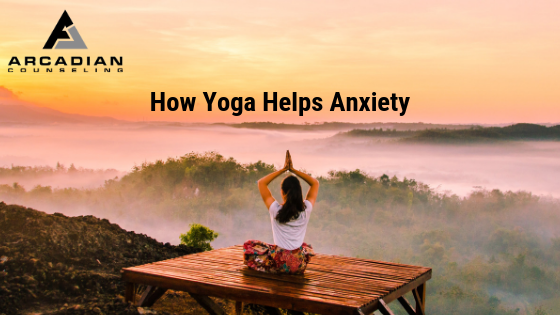Life is full of moments that cause us to feel stressed or nervous.
Getting up and speaking in front of a large group of people. Starting a new school. Preparing for a job interview. These are all scenarios can make us fearful, anxious or nervous. Sometimes this results in sleepless nights and performance jitters.
Let’s be clear though; this is all normal. Most people experience this. The problem starts when this fear becomes persistent and overwhelming and interferes with your daily life. At this point “normal fear” can become a full-blown anxiety disorder.
While a licensed therapist should be consulted to develop a plan for treating an anxiety disorder, yoga is an effective and natural way to get some relief from symptoms like trouble sleeping, muscle tension, inflammation, and chronic pain and digestive problems.
Yoga can help control and manage the symptoms of anxiety in many ways. Here are a few:
Yoga Builds Confidence
Anxiety can result from a lack of confidence in our ability to handle negative situations, either real or theoretical, that may arise. We are not so much fearful of public speaking as we are fearful that we are somehow going to screw up.
Yoga is a major confidence builder. It works to strengthen the body and mind at the same time. It’s a discipline that includes bodily postures and breathing techniques, along with ancient meditation approaches. This combination can help a person feel calm, centered, and empowered to handle most situations that surface in life.
Yoga Distracts Your Mind
What can you do when your mind seems to be stuck in an endless loop of negative and worrying thought? Distract with other thoughts.
Yoga trains a person to focus their thoughts on the moment, specifically by thinking only about their rhythmic breathing. As soon as the mind wanders to negative thoughts, one simply brings their thoughts back to the breath without anger or judgment. Feelings of calmness and acceptance naturally follow this intense breath work.
Yoga Can Be Like Your Inner Therapist
Yoga is a great complement to therapy, because like your therapist, yoga helps you to observe how your mind works. And also like your therapist, there is no judgment involved. Meditation is simply about paying attention to the thoughts you were having, keeping the thoughts that are helpful and releasing those that are harmful.
Yoga and meditation will also help you to train your mind to focus on the positive aspects of your life. When you surround yourself with positivity, the fear of negativity subsides.
James Killian, LPC is an anxiety counselor and the Principal Therapist & Owner of Arcadian Counseling in Woodbridge, CT. If you or someone you know is struggling with anxiety and yoga just isn’t cutting it, call today for a free consultation.

